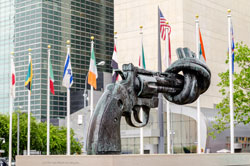Contributed by Brian Hiortdahl, Overland, KS
Warm-up Question
What are you hoping for this Christmas? What are you expecting? Are your hopes and expectations the same, or are they different?
A Step Forward or Backward?
Last month, a coalition of powerful world nations struck an initial deal with Iran, setting limits on its nuclear program while easing economic sanctions against the country. Reaction to this breakthrough step has been mixed, with some praising it as a step forward toward stability, transparency, and peace, and others condemning it as a step backward that allows Iran to become more volatile, establishes a worrisome negotiating precedent, and makes the world more dangerous:
Discussion Questions
- Do you think this historic deal is a step forward or backward? Why?
- What do you think Jesus would have to say about this development?
- Is there a comparable situation in your local community? Who or what threatens peace and safety in your school or your neighborhood or your church? What should be done about it, and who needs to talk together to work on a just solution?
Scripture Texts (NRSV) for Sunday, December 15, 2013 (Third Sunday of Advent)
(Text links are to Oremus Bible Browser. Oremus Bible Browser is not affiliated with or supported by the Evangelical Lutheran Church in America. You can find the calendar of readings for Year C at Lectionary Readings.)
For lectionary humor and insight, check the weekly comic Agnus Day.
Gospel Reflection
John the Baptist wasn’t sure whether he could trust Jesus or not. John held high ethical standards of righteousness and high expectations of a purifying Messiah who would clean house, clearly and decisively separating good from evil. John’s undiplomatic clarity helped land him in prison when he preached against the adulterous shenanigans of the royal family, so he was unable to experience Jesus’ ministry firsthand. He did get rumors and reports, however, of Jesus’ teaching and healing, which were full of power but not punishment. John focused on an ax lying at the root of the trees; Jesus preached about sowing seeds. John warned about a winnowing fork and a consuming fire; Jesus blessed the humble and warmed the heart. John’s preaching was direct and confronted political power brokers; Jesus told strange stories that invited people without power into mysterious hope.
John sent his students to Jesus, therefore, with a typically direct question: “Are you the one who is to come, or are we to wait for another?” Jesus sent back a typically indirect, what-do-you-think reply: “Go and tell John what you hear and see: the blind receive their sight, the lame walk, the lepers are cleansed, the deaf hear, the dead are raised, and the poor have good news brought to them. And blessed is anyone who takes no offense at me.” He then praised John to the crowds and pointed to a new reality, “the kingdom of heaven,” which would surpass anything John could imagine, even though he was the greatest prophet ever to prepare its way.
John is left to wonder: Is Jesus a step forward, or a step backward? Is his bottom up, lift the lowly approach the surprising way that God has chosen to right the world, or is it an exercise in naive futility? Is he bringing peace or being too soft?
Discussion Questions
- Read Matthew 3:1-17 and 4:12-23. What do the preaching of John and Jesus have in common? How do they differ? What does each preacher teach us about God?
- Would you rather have Jesus or John at the negotiating table with Iran? Why?
- How is Jesus portrayed in media and popular culture? What are our present day expectations of him, and are they realistic?
- If someone asked you about Jesus, what would you tell them?
- Traditionally, the season of Advent stresses the second coming of Jesus. What do you think Jesus will look like when it happens?
Activity Suggestions
- As a group, make a list of typical holiday expectations. Do these lead to hope and joy or to disappointment?
- Write a letter to your senator expressing your opinion about the deal with Iran, grounding your position in your Christian faith.
Closing Prayer
Come, thou long expected Jesus. Prepare us for the kingdom of heaven, set us free from misguided expectations, and open our eyes to see the surprising gifts of grace you bring to us and to all the world. Amen.




